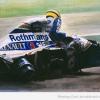Hello all
I've watched some races from the 80ies and 90ies recently and I was very impressed by how interesting they were.
Reliability provided some of the spice, but mainly the interest lay in the different moments of the race: each driver had to have a strategy about tires and fuel. And, also, about how to ballance his own physical resistance.
For instance, Senna's strategy seemed to be to take pole and then try to maintain it (he was not notably faster than the other drivers in the race, except in the wet). Lauda's strategy was quite different (as he knew he was no longer the faster qualifier he always attacked in the races with a set up for racing and not qualifying)). Prost was a master on how to break rivals' motivation (he was a very impressive driver overall: fast when needed, nursing his car if necessary, playing a wating game and then braking all opposition).
As the cars were very powerfull and less dependent on aero than now overtaking was possible.
Tires might be made to last for the entire race or not, and some magnificent surprises did come up.
Also, drivers were well ballanced between them: Lauda, Prost, Senna, Mansell (in the Williams phase) might be expected to match each other.
There were less rules, more excitement, I found myself enthralled in races I had seen the way I no longer do in today's F1.
The problem began with the ideia of groved tires and then Schumacher was so much faster than all the other drivers that the ballance in the Lauda-Prost or Prost-Senna years was lost.
Nowadays drivers seem again more or less well ballanced, but racing is too rigid (mandatory pitstops and too many rules, blue flags and so on).
"So what's your point", you may be thinking? Make rules less rigid, races a bit longer, tires a bit larger and more lasting.
Just my opinion.





















